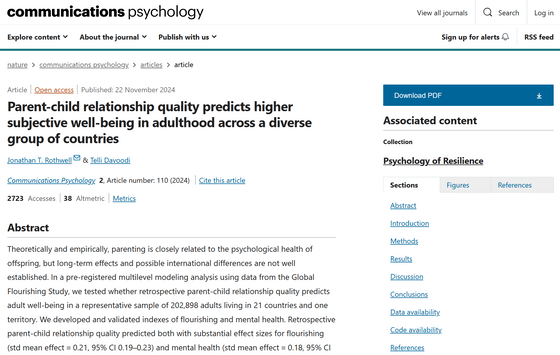It turns out that the quality of parent-child relationships can predict happiness in adulthood

Many studies have been conducted on the relationship between parents and children during the child-rearing period, and some reports have shown that '
Parent-child relationship quality predicts higher subjective well-being in adulthood across a diverse group of countries | Communications Psychology
https://www.nature.com/articles/s44271-024-00161-x

Quality of parent-child relationships predicts adulthood well-being, 21-country finds
The presence of parents is essential for children's development. However, although numerous studies have proven that parenting is closely related to children's psychological health, the current situation is that discussions about the long-term effects of parenting and differences between countries have not been fully established.
So, Jonathan Rothwell, a psychologist at the Brookings Institution in the United States, and his colleagues conducted a large-scale survey across the United States related to parenting conditions, parent-child relationship quality, and adolescent mental health. By collecting responses from young people of different racial and ethnic backgrounds, they confirmed that there was a very strong correlation between parenting conditions, parent-child relationship quality, and adolescent mental health.
Next, Rothwell and his team looked at data from 202,898 people living in 21 countries and one region to see whether early parent-child relationships could predict happiness in adulthood. To maximize religious and ethnic diversity, the study included a wide range of regions, including the United States, Japan, Hong Kong, Turkey, and Kenya.

The data included responses to surveys asking about the quality of parent-child relationships, such as 'Which of you felt loved more by your mother or your father while you were growing up?', 'Was your relationship with each parent very good, somewhat good, bad, or very bad?', and 'Have you ever felt like an outsider at home?'
Rothwell and her colleagues also explored adult happiness by examining responses to questions such as, 'Even in the face of difficulties, do you always remain hopeful about the future?' and, 'If you were to look back on your life and make a list of all the things you're grateful for, would it be a long list?'

They found that the quality of parent-child relationships during childhood was most closely associated with happiness as an adult, regardless of other factors such as the parents' economic situation, the child's current level of education, the child's household income, or gender.
'The association was observed in all countries except one, where the participants were younger than the others. This suggests that the link between parent-child relationships and lifelong happiness is universal and applies to everyone, regardless of where they grew up,' Rothwell and his colleagues wrote.
Specifically, 81% of respondents reported that they 'felt loved by their father before they became adults,' and 89% reported that they 'felt loved by their mother before they became adults.' In addition, 4% of respondents answered that they had a 'very bad relationship with their father,' 2% answered that they had a 'very bad relationship with their mother,' 58% answered that they had a 'very good relationship with their father,' and 65% answered that they had a 'very good relationship with their mother.'
The quality of parent-child relationships seems to vary greatly from country to country. For example, in Indonesia, 96% of people answered that they 'felt loved by their father before they became adults,' and the figures were also generally high in Nigeria (95%) and Egypt (93%), but in Japan the figure was only 66%. The same was true for mothers, with figures of over 97% in Indonesia, Nigeria and Egypt, but only 74% in Japan. As in Japan, low figures were also found in Hong Kong.

Overall, the effect of parent-child relationships on happiness seemed to be more pronounced in high-income countries, Rothwell said, probably because most people living in wealthy countries don't have to worry about food, housing, security, and other basic necessities of life. In addition, the study found that parents with stronger religious beliefs tend to have better relationships with their children.
'We plan to conduct new research to learn more about the parenting styles that foster the highest quality relationships and lead to improved long-term mental health,' Rothwell said. 'We also want to look at how parenting affects children's personality and moral development, and further clarify the influence of genetics and parenting.'
Related Posts:
in Science, Posted by log1p_kr







